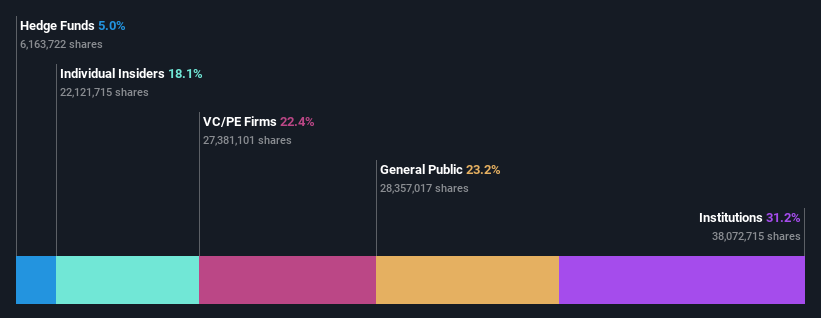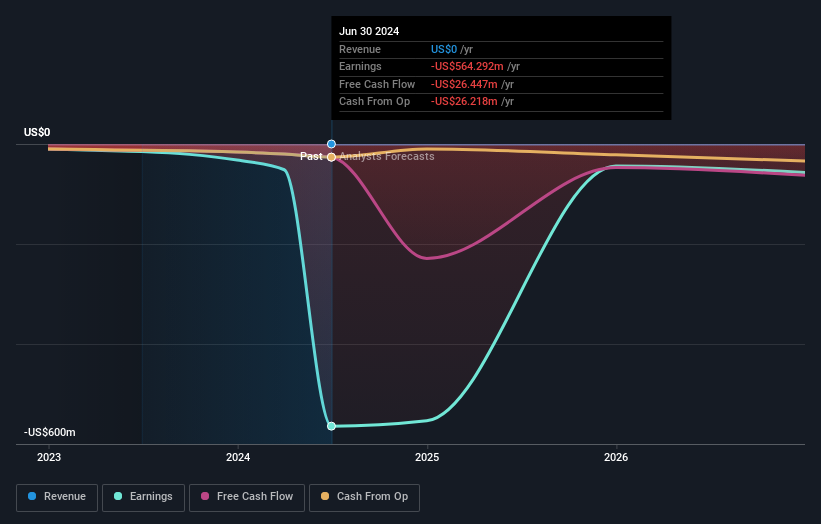- United States
- /
- Electric Utilities
- /
- NYSE:OKLO
In the wake of Oklo Inc.'s (NYSE:OKLO) latest US$249m market cap drop, institutional owners may be forced to take severe actions

Key Insights
- Significantly high institutional ownership implies Oklo's stock price is sensitive to their trading actions
- 53% of the business is held by the top 8 shareholders
- 18% of Oklo is held by insiders
To get a sense of who is truly in control of Oklo Inc. (NYSE:OKLO), it is important to understand the ownership structure of the business. And the group that holds the biggest piece of the pie are institutions with 31% ownership. That is, the group stands to benefit the most if the stock rises (or lose the most if there is a downturn).
And so it follows that institutional investors was the group most impacted after the company's market cap fell to US$1.1b last week after a 18% drop in the share price. The recent loss, which adds to a one-year loss of 11% for stockholders, may not sit well with this group of investors. Also referred to as "smart money", institutions have a lot of sway over how a stock's price moves. As a result, if the downtrend continues, institutions may face pressures to sell Oklo, which might have negative implications on individual investors.
Let's delve deeper into each type of owner of Oklo, beginning with the chart below.
See our latest analysis for Oklo

What Does The Institutional Ownership Tell Us About Oklo?
Institutional investors commonly compare their own returns to the returns of a commonly followed index. So they generally do consider buying larger companies that are included in the relevant benchmark index.
Oklo already has institutions on the share registry. Indeed, they own a respectable stake in the company. This can indicate that the company has a certain degree of credibility in the investment community. However, it is best to be wary of relying on the supposed validation that comes with institutional investors. They too, get it wrong sometimes. When multiple institutions own a stock, there's always a risk that they are in a 'crowded trade'. When such a trade goes wrong, multiple parties may compete to sell stock fast. This risk is higher in a company without a history of growth. You can see Oklo's historic earnings and revenue below, but keep in mind there's always more to the story.

It would appear that 5.0% of Oklo shares are controlled by hedge funds. That's interesting, because hedge funds can be quite active and activist. Many look for medium term catalysts that will drive the share price higher. The company's largest shareholder is SuRo Capital Corp., with ownership of 11%. In comparison, the second and third largest shareholders hold about 9.2% and 8.9% of the stock. Note that the second and third-largest shareholders are also Chief Executive Officer and Member of the Board of Directors, respectively, meaning that the company's top shareholders are insiders.
We did some more digging and found that 8 of the top shareholders account for roughly 53% of the register, implying that along with larger shareholders, there are a few smaller shareholders, thereby balancing out each others interests somewhat.
While studying institutional ownership for a company can add value to your research, it is also a good practice to research analyst recommendations to get a deeper understand of a stock's expected performance. There are plenty of analysts covering the stock, so it might be worth seeing what they are forecasting, too.
Insider Ownership Of Oklo
The definition of an insider can differ slightly between different countries, but members of the board of directors always count. The company management answer to the board and the latter should represent the interests of shareholders. Notably, sometimes top-level managers are on the board themselves.
Insider ownership is positive when it signals leadership are thinking like the true owners of the company. However, high insider ownership can also give immense power to a small group within the company. This can be negative in some circumstances.
It seems insiders own a significant proportion of Oklo Inc.. Insiders own US$202m worth of shares in the US$1.1b company. That's quite meaningful. Most would be pleased to see the board is investing alongside them. You may wish to access this free chart showing recent trading by insiders.
General Public Ownership
The general public, who are usually individual investors, hold a 23% stake in Oklo. While this group can't necessarily call the shots, it can certainly have a real influence on how the company is run.
Private Equity Ownership
Private equity firms hold a 22% stake in Oklo. This suggests they can be influential in key policy decisions. Sometimes we see private equity stick around for the long term, but generally speaking they have a shorter investment horizon and -- as the name suggests -- don't invest in public companies much. After some time they may look to sell and redeploy capital elsewhere.
Next Steps:
It's always worth thinking about the different groups who own shares in a company. But to understand Oklo better, we need to consider many other factors. Like risks, for instance. Every company has them, and we've spotted 3 warning signs for Oklo (of which 1 doesn't sit too well with us!) you should know about.
If you are like me, you may want to think about whether this company will grow or shrink. Luckily, you can check this free report showing analyst forecasts for its future.
NB: Figures in this article are calculated using data from the last twelve months, which refer to the 12-month period ending on the last date of the month the financial statement is dated. This may not be consistent with full year annual report figures.
New: AI Stock Screener & Alerts
Our new AI Stock Screener scans the market every day to uncover opportunities.
• Dividend Powerhouses (3%+ Yield)
• Undervalued Small Caps with Insider Buying
• High growth Tech and AI Companies
Or build your own from over 50 metrics.
Have feedback on this article? Concerned about the content? Get in touch with us directly. Alternatively, email editorial-team (at) simplywallst.com.
This article by Simply Wall St is general in nature. We provide commentary based on historical data and analyst forecasts only using an unbiased methodology and our articles are not intended to be financial advice. It does not constitute a recommendation to buy or sell any stock, and does not take account of your objectives, or your financial situation. We aim to bring you long-term focused analysis driven by fundamental data. Note that our analysis may not factor in the latest price-sensitive company announcements or qualitative material. Simply Wall St has no position in any stocks mentioned.
About NYSE:OKLO
Oklo
Designs and develops fission power plants to provide reliable and commercial-scale energy to customers in the United States.
Flawless balance sheet low.

